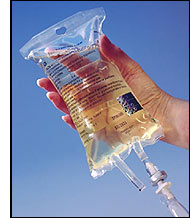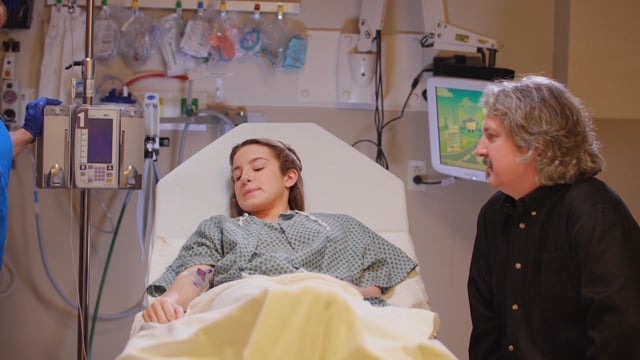What Is Chemotherapy?
Chemotherapy (say: kee-moe-THER-ah-pee) is the use of medicines to treat cancer.
Cancer is a disease that causes normal cells in the body to grow out of control. If left untreated, these cells can grow throughout the body making the person very sick.
How Does Chemotherapy Work?
Chemotherapy medicines stop the growth of cancer cells. As the cancer goes away, the patient starts to feel better.
Both adults and kids can get cancer. No matter what age a person is, chemotherapy (also called chemo) may be used to treat the cancer.
Sometimes people need to stay in the hospital to get chemo. But often, a person can just come to the hospital or doctor's office for treatment and go home afterward.
How Is Chemo Given?
Just as you can get other medicines by taking a pill or getting a shot, there are several ways to get chemo. A doctor called an oncologist (say: on-KAH-leh-jist) will make the decision about which type of chemo is best for the patient.
A person might take a pill or liquid or get an injection (shot). Another way of giving chemo is through an IV line, which is short for an intravenous (say: in-truh-VEE-nus) line.

An IV line is a tiny tube that's put into a vein through someone's skin, usually on the arm. The IV line is attached to a bag or pump that holds the medicine. The chemo medicine flows from the bag or pump into the vein, which puts the medicine into the blood. Once the medicine is in the blood, it can travel through the body and attack cancer cells.
Sometimes doctors will put a larger IV line into a larger vein in the upper chest. This lets a person to get chemo and other medicines easily without having to get a needle in the arm each time.
-

Getting an IV
IVs are a way to get fluids or medicines right into a person's body through a vein.
What's Chemo Like?
The kinds of treatment used to fight cancer depend on the type of cancer and where in the body the cancer is found.
During chemo, a person might have some temporary health problems called side effects. All medicines can have side effects. In their effort to kill cancer cells, chemo drugs can make normal cells sick.
Because everyone's different, some people will have fewer side effects than others. Common side effects of chemo are loss of appetite, nausea, vomiting, and temporary hair loss. Someone people also might feel tired, bruise easily, and catch infections easily.
Medicines are available that can help people feel better if they have side effects from chemo. Doctors, nurses, and other members of the cancer treatment team will try to answer questions, help the person get well, and make him or her comfortable. And having family and friends around for support also can make someone feel better.
Coping With Chemo
Here are some tips for a person who's getting chemo:
- Get plenty of sleep.
- Eat healthy meals and drink plenty of fluids.
- Wash hands well and often, especially before eating, after using the bathroom, and after touching animals. This helps to prevent infection.
- Do not share cups or utensils with anyone.
- Avoid large crowds and anyone who has a cold, the flu, or chickenpox. It's not a good time to get sick.
After chemo is over, the person will need to visit the doctor for checkups. The doctor will want to know how the person is feeling and check to see if the chemo did its job treating the cancer.
If you know someone who has cancer, the person will appreciate your phone calls, email messages, cards, letters, and visits. Let the person know you care and still want to spend time together. It is important to remember that cancer is not contagious — you cannot catch it from someone else or pass it on.
And if you're a kid who has cancer, let your friends know you want to see them. Sometimes, people stay away because they think they might get in the way, don't know if you're allowed to have visitors, or worry that they'll disturb you if you're resting.
As long as your doctor and your parent say it's OK, get together with your friends and have some fun!


